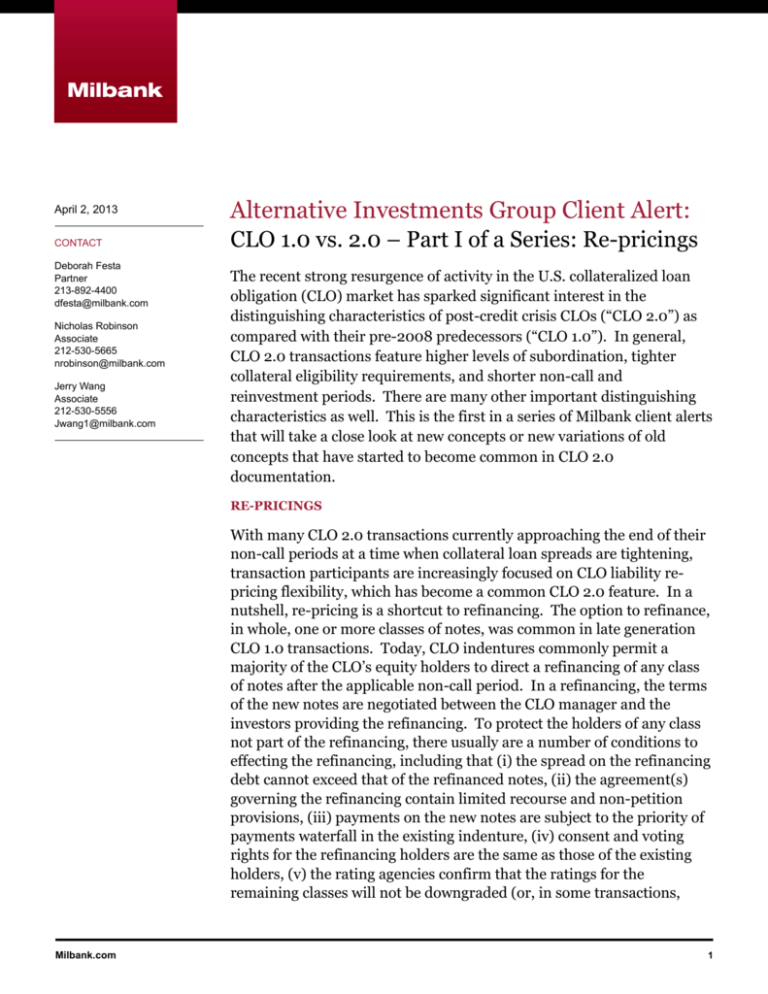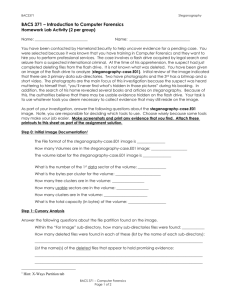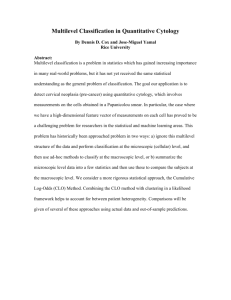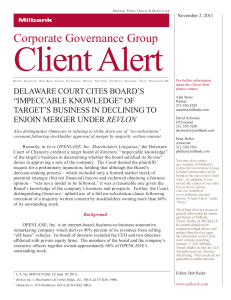
April 2, 2013
CONTACT
Deborah Festa
Partner
213-892-4400
dfesta@milbank.com
Nicholas Robinson
Associate
212-530-5665
nrobinson@milbank.com
Jerry Wang
Associate
212-530-5556
Jwang1@milbank.com
Alternative Investments Group Client Alert:
CLO 1.0 vs. 2.0 – Part I of a Series: Re-pricings
The recent strong resurgence of activity in the U.S. collateralized loan
obligation (CLO) market has sparked significant interest in the
distinguishing characteristics of post-credit crisis CLOs (“CLO 2.0”) as
compared with their pre-2008 predecessors (“CLO 1.0”). In general,
CLO 2.0 transactions feature higher levels of subordination, tighter
collateral eligibility requirements, and shorter non-call and
reinvestment periods. There are many other important distinguishing
characteristics as well. This is the first in a series of Milbank client alerts
that will take a close look at new concepts or new variations of old
concepts that have started to become common in CLO 2.0
documentation.
RE-PRICINGS
With many CLO 2.0 transactions currently approaching the end of their
non-call periods at a time when collateral loan spreads are tightening,
transaction participants are increasingly focused on CLO liability repricing flexibility, which has become a common CLO 2.0 feature. In a
nutshell, re-pricing is a shortcut to refinancing. The option to refinance,
in whole, one or more classes of notes, was common in late generation
CLO 1.0 transactions. Today, CLO indentures commonly permit a
majority of the CLO’s equity holders to direct a refinancing of any class
of notes after the applicable non-call period. In a refinancing, the terms
of the new notes are negotiated between the CLO manager and the
investors providing the refinancing. To protect the holders of any class
not part of the refinancing, there usually are a number of conditions to
effecting the refinancing, including that (i) the spread on the refinancing
debt cannot exceed that of the refinanced notes, (ii) the agreement(s)
governing the refinancing contain limited recourse and non-petition
provisions, (iii) payments on the new notes are subject to the priority of
payments waterfall in the existing indenture, (iv) consent and voting
rights for the refinancing holders are the same as those of the existing
holders, (v) the rating agencies confirm that the ratings for the
remaining classes will not be downgraded (or, in some transactions,
Milbank.com
1
notice is provided to the rating agencies) and (vi) a customary tax
opinion be delivered with respect to both the new and existing debt.
In a re-pricing, the only change to the terms of the re-priced class or
classes is to the spread over LIBOR (or to the interest rate, in the case of
any fixed rate classes), a change effected through a supplemental
indenture. Therefore, the option to re-price spares the time and expense
of negotiating and entering into agreements with new noteholders and
obtaining rating confirmations from the rating agencies and tax opinions
from counsel. Structured appropriately, re-pricing, as an alternative to
refinancing, also avoids the risk of the new debt being characterized as a
new offering, which could require the preparation and dissemination of
new offering materials.
Under recent CLO indentures, a re-pricing typically may be initiated at
the direction of a majority of the CLO’s equity holders. Many indentures
provide that AAA-rated notes are exempt from re-pricing, although this
is not always the case. In some cases, investors in AAA-rated notes are
entitled to receive make-whole payments if their notes are re-priced.
Notice of a re-pricing is typically provided well in advance (between 25
to 45 business days) to allow the affected holders to decide whether or
not to consent to the re-pricing of their notes. Non-consenting holders
will be paid the outstanding principal and accrued interest on their
notes, and their notes will be sold to consenting holders or (to the extent
not sold to consenting holders) into the market by a “re-pricing
intermediary.” While rating agency confirmations typically are not
required, rating agencies sometimes require notice of the re-pricing.
Managers and equity holders have been negotiating re-pricing
provisions as an option to provide for a more expeditious and less
expensive means to refinance the CLO issuer’s notes. Debt investors
may also prefer to be re-priced rather than refinanced as it is a more
cost-efficient and quicker alternative to re-deploying capital in a new
transaction, given the fact that, in a lower interest rate environment,
having one’s notes redeemed may otherwise be inevitable. Alternatively,
certain debt investors may not want to facilitate attempts to re-price
notes upon the earliest sign of decreasing collateral spreads, and as a
result may wish to include as conditions to initiating a re-pricing (i) that
the CLO manager provide evidence that spreads have tightened by a
certain threshold amount over a certain amount of time, (ii) payment of
a premium or fee to re-price a class of notes (which cost could be less
than the anticipated cost of a refinancing but would also provide an
additional incentive to existing holders to agree to re-price their notes),
or (iii) that a certain threshold of existing holders consent to the repricing. Managers and equity holders may argue, however, that such
CLIENT ALERT: Alternative Investments Group
April 2, 2013
2
conditionality is not appropriate if re-pricings can occur only after the
non-call period, at which time the CLO issuer would otherwise be
permitted to redeem the notes, either by refinancing or liquidation of
assets.
It bears noting that because re-pricing features can invoke special taxrelated considerations, they should be designed in collaboration with
experienced tax lawyers.
CLIENT ALERT: Alternative Investments Group
April 2, 2013
3
ALTERNATIVE
INVESTMENTS
GROUP
Please feel free to discuss any
aspects of this Client Alert with
your regular Milbank contacts or
any of the members of our
Alternative Investments Group.
If you would like copies of our
other Client Alerts, please visit
our website at www.milbank.com
and choose “Client Alerts” under
“News.”
This Client Alert is a source of
general information for clients
and friends of Milbank, Tweed,
Hadley & McCloy LLP. Its content
should not be construed as legal
advice, and readers should not
act upon the information in this
Client Alert without consulting
counsel. ©2013 Milbank, Tweed,
Hadley & McCloy LLP. All rights
reserved. Attorney Advertising.
Prior results do not guarantee a
similar outcome.
NEW YORK
One Chase Manhattan Plaza, New York, NY 10005
Trayton Davis
tdavis@milbank.com
+1-212-530-5349
Deborah Festa
dfesta@milbank.com
+1-212-530-5540
Jay Grushkin
jgrushkin@milbank.com
+1-212-530-5346
Elizabeth Besio Hardin
ehardin@milbank.com
+1-212-530-5037
Bruce Kayle
bkayle@milbank.com
+1-212-530-5956
Eric Moser
emoser@milbank.com
+1-212-530-5388
Albert Pisa
apisa@milbank.com
+1-212-530-5319
Blair Tyson
btyson@milbank.com
+1-212-530-5233
Andrew Walker
awalker@milbank.com
+1-212-530-5624
Nicholas Robinson
nrobinson@milbank.com
+1-212-530-5665
Jerry Wang
Jwang1@milbank.com
+1-212-530-5556
LOS ANGELES
601 South Figueroa Street, 30th Floor Los Angeles, CA 90017
Deborah Festa
dfesta@milbank.com
+1 213-892-4400
London
10 Gresham Street London EC2V 7JD England
James Warbey
CLIENT ALERT: Alternative Investments Group
April 2, 2013
jwarbey@milbank.com
+44-20-7615-3064
4










